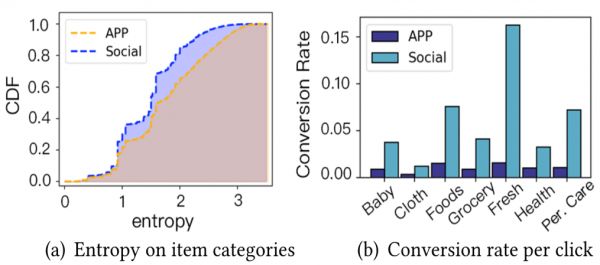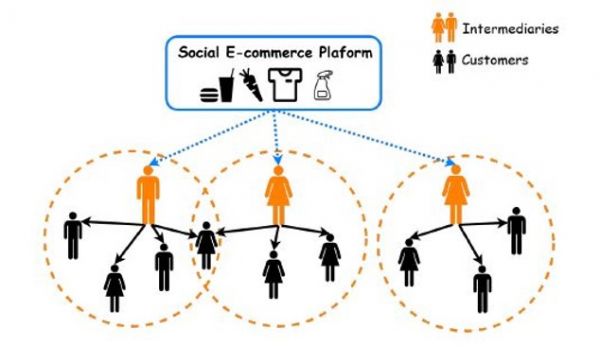Social E
Social
E-commerce
A New Paradigm Coupling Social Relationships and Economic Behaviors


Introduction
Social commerce typically refers to e-commerce that uses social media to help e-commerce transactions and activities, with classic examples such as Facebook commerce and Instagram commerce. Recently various novel forms of social commerce have become increasingly popular in China, which can be categorized into several types: content-sharing platforms, membership-based platforms, and team purchase platforms. These platforms can achieve great success and expand to a large scale rapidly. For example, Pinduoduo acquired over 200 million users in less than three years and the daily order volume ranks second in mainland China next to Taobao link. Beidian attained nearly 40 million users in less than 1.5 years.
Notably, most recent social commerce platforms are embedded within instant messaging platforms, i.e., WeChat under Chinese context, where the key drivers are mostly real-world relationships, especially close relationships. As such, these platforms penetrate and leverage existing real-world close social relationships and incorporate Chinese guanxi into market transactions, in contrary to traditional social commerce where key opinion leaders (e.g., brand, celebrity) play the leading role. These platforms are typically referred to as social e-commerce (in Chinese, 社交电商) in China. Social e-commerce has provided a unique and exciting avenue to investigate the interplay between social relationships and economic behaviors.


Here we present a series of research works to study recent emerging social e-commerce in China from the following two angles:
Mechanism understanding Algorithm designWe draw upon an interdisciplinary approach bridging computer science and social science, with researchers from Tsinghua University, Stanford University, Harvard Business School, Kyoto University, City University of Hong Kong, etc.
We also released two datasets on social e-commerce to benefit the research community. link
Project I: Mechanism Understanding
Understanding novel characteristics of Social E-commerce
To uncover the characteristics of social e-commerce, we comprehensively investigate social e-commerce from various perspectives. Specifically,
We empirically measure network structure and dynamics of social e-commerce platform (Cao et al. ICWSM 2020), where we show social e-commerce distinguishes itself from prior e-commerce in decentralized network structure, invitation cascades, purchasing homophily, and user loyalty; We examine purchase motivations and user experiences (Cao et al. CSCW 2021) through in-depth qualitative and study people's purchase behaviors through large-scale quantitative analysis (Xu et al. CSCW 2019). We find social e-commerce leads to a 3.09∼10.37 times higher purchase conversion rate than the conventional settings, which can be explained by mechanisms of better matching, social enrichment, social proof, and price sensitivity (Xu et al. CSCW 2019). We show social e-commerce enables more reachable, cost-reducing, and ubiquitous user shopping experiences, shapes decision-making process and creates novel social interactions (Cao et al. CSCW 2021) and successfully engages the traditionally underserved community in Chinese developing regions by acting as and beyond virtual bazaars (Chen et al. CHI 2022);
We examine purchase motivations and user experiences (Cao et al. CSCW 2021) through in-depth qualitative and study people's purchase behaviors through large-scale quantitative analysis (Xu et al. CSCW 2019). We find social e-commerce leads to a 3.09∼10.37 times higher purchase conversion rate than the conventional settings, which can be explained by mechanisms of better matching, social enrichment, social proof, and price sensitivity (Xu et al. CSCW 2019). We show social e-commerce enables more reachable, cost-reducing, and ubiquitous user shopping experiences, shapes decision-making process and creates novel social interactions (Cao et al. CSCW 2021) and successfully engages the traditionally underserved community in Chinese developing regions by acting as and beyond virtual bazaars (Chen et al. CHI 2022);  We delineate the ecology of social e-commerce and illustrate agents'/intermediaries' roles and uncover agent transformation (Xu et al. ICWSM 2021) and agent role in social e-commerce (Chen et al. CSCW 2020). We find agents on social e-commerce act as local trend detectors and “social grocers” and identify several successful strategies agents take (Chen et al. CSCW 2020). We uncover that bringing agents into the recommendation loop significantly alleviates recommendation homogeneity (Piao et al. CSCW 2021). We identify social conformity, social enrichment, refusal avoidance, and benefit-cost trade-off as mechanisms affecting agent invitation and transformation (Xu et al. ICWSM 2021).
We delineate the ecology of social e-commerce and illustrate agents'/intermediaries' roles and uncover agent transformation (Xu et al. ICWSM 2021) and agent role in social e-commerce (Chen et al. CSCW 2020). We find agents on social e-commerce act as local trend detectors and “social grocers” and identify several successful strategies agents take (Chen et al. CSCW 2020). We uncover that bringing agents into the recommendation loop significantly alleviates recommendation homogeneity (Piao et al. CSCW 2021). We identify social conformity, social enrichment, refusal avoidance, and benefit-cost trade-off as mechanisms affecting agent invitation and transformation (Xu et al. ICWSM 2021).  We further demonstrate that accurate customer value prediction (Piao et al. WWW 2021) and community value prediction (Zhang et al. WWW 2021) in social e-commerce can be achieved with graph neural networks modeling the complex social interplay, and show how social influence can be causally modelled for churn prediction on social e-commerce (Zhang et al. WSDM 2022).
We further demonstrate that accurate customer value prediction (Piao et al. WWW 2021) and community value prediction (Zhang et al. WWW 2021) in social e-commerce can be achieved with graph neural networks modeling the complex social interplay, and show how social influence can be causally modelled for churn prediction on social e-commerce (Zhang et al. WSDM 2022). Project II: Algorithm Design
Developing Better Recommender Systems in Social E-Commerce
Based on understanding of social e-commerce mechanisms, we further proposed a series of novel algorithms for building more effective recommender systems on social e-commerce. Specifically, we tackled the following scenarios:
More details about our related publications can be found in link.
Datasets
We open source the following two datasets to benefit the community.
Sharing-Purchase Behavior DatasetUsed in Fine-grained Social Recommendation, Cross-platform Social Recommendation and Word-of-mouth Recommendation
A. Sharing-and-Purchase: Sharer || Receiver || Item
B. Traditional-Purchase: User || Item
C. Social Relation: User || User
Our dataset are available at Github.
Group-purchase DatasetUsed in Group-buying Recommendation
A. Successful Group-purchase Behavior: Launcher || Participant Users || Item
B. Failed Group-purchase Behavior: Launcher || Item
C. Social Relation: User || User
Our dataset are available at Github.
Team
28 PageviewsMay. 25th - Jun. 25th相关知识
Social Robots for the Human Well
Social Wellness Toolkit
社交媒体营销(Social Media Marketing)指的是()
Effect of Social Support on Psychological Well
E=鹅! 巨人网络“E计划”悬念揭晓
Psychological Approaches to Health and Social Care Service Essay
Relationship of childhood abuse,social support and psychological sub
Language, Context and Text: The Social Semiotics Forum
Conceptualizing and Measuring Social Media Use in Health and Well
Ethical Thinking of Social Support for Current College Students' Psychological Health
网址: Social E https://m.trfsz.com/newsview1460670.html

